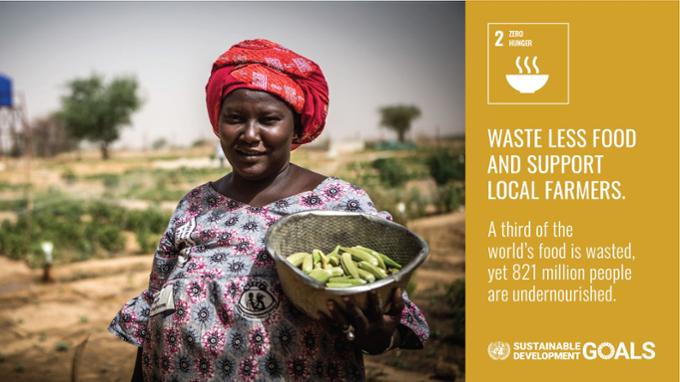Zero Hunger
Hunger and food insecurity, fueled by a complex interplay of factors, demands coordinated global efforts to address this critical humanitarian challenge. Research conducted on university campuses has indicated that approximately 40% of post-secondary students in Canada are affected by food insecurity.
The University has taken steps to address food insecurity through various programs, events and research. Below is a list of related campus and community-based organizations in Regina. To access these supports, or lend a hand as a volunteer, visit the webpages below.
Past News and Events
- U of R researchers awarded nearly $600,000 through Agriculture Development Fund (2021)
- U of R Researchers Actively Engaged in Projects that Positively Impact Agriculture Sector (2020)
- Earth Day webinar - Change and Resistance: Agriculture and the Environment (2020)
- A bountiful harvest: RPIRG Green Patch Garden puts nutritious food on the table for all (2020)
- U of R researchers highlight ag research that hits home at this year's Canadian Western Agribition (2019)
Related Courses
BIOL 276 - Environmental Biology
This course discusses the biological basis for environmental change and its impacts on human society and will review the patterns, causes and consequences of human-induced and natural environmental change. Topics will include: global warming, acid rain, ozone depletion, fisheries collapse, sustainable forestry, agriculture, biodiversity, and conservation. For Biology, Environmental Science and Environmental Studies Majors.
*** Prerequisite: BIOL 100 and 101, or BIOL 150 and ENST 200 ***
ECON 100 - Introduction to Economic Issues
An introduction to the economic way of thinking. Basic economic concepts are used to explore current economic issues such as unemployment, inflation, economic growth, taxation, competition, pollution reduction, health care, and more.
*Note: Students who have received credit for either ECON 201 or 202, or any ECON course numbered 300 or higher may not take ECON 100 for credit.*
ECON 233 - Issues in Canadian Agriculture
Applies economic theory to current problems facing Canadian and world agriculture. Supply and demand conditions in world markets. Causes and effects of government support programs. Impact of WTO agreements.
***Prerequisite: 15 credit hours or ECON 100.***
ENEL 895AN - Multisource Information Fusion
This course deals with multi-sensor and multi-source information fusion. Topics include data/image, feature, decision, and multilevel fusion; common data representation formats; spatial and temporal alignment; multi-look temporal fusion; multiresolution analysis, parameter estimation; Bayesian decision analysis; fusion architectures; deep learning for sensor fusion; application of information fusion in agriculture
ENEL 895AP - Machine Learning for Precision Agriculture
The primary focus of this course is on practical applications of machine learning in precision agriculture. The course topics include classification, object detection and segmentation (semantic and instance) of field images, and quantitative and qualitative soil data analysis. The course also includes multi-source data fusion, one and few-shot learning, and programming for multiple GPUs.
GES 326 - Environment and Resource Management
A systematic analysis of geographical aspects of theory and methods of natural resource management. Focus is on the geographer's role in resource analysis and policy decisions with examples from agriculture, forestry, wildlife, energy, and parks.
***Prerequisite: 30 credit hours, including GES 100 or GES 120, or permission of the Department Head.***
*Note: Students may receive credit for only one of GES 326 and GEOG 326.*
IS 420 - Advanced Topics in International Development
This seminar course examines critical perspectives of international development. Topics include, among others, strategies to alleviate poverty, population growth and scarcity, urbanization, land rights, microfinance, displacement and development refugees, environmental sustainability, and the role of civil society in development.
***Prerequisite: IS 220 and 60 credit hours, or permission of the department head***
*Note: Formerly numbered DEVS 400. Students may receive credit for one of DEVS 400 or IS 420*
MU 399AB - Music Technology in the Classroom
A course, covering instruction of technology in the band, choir, and music classrooms. Practical issues such as the setup and use of audio equipment, microphone selection and techniques, mixing boards, music notation and theory software, recording systems and use in the classroom, and phone apps that aid students and teachers.
PAST 400 - Pastoral Studies Practicum
This is a required course for all students. With support from the practicum supervisor, students will become directly involved in pastoral counseling to clients in the community. This practicum is 80 hours in duration, however, the exact days or hours per day will be negotiated between the student and the agency.
*** Prerequisite: PAST 310 and PAST 320 ***
PSCI 473 - Erasure and Resurgence: Indigenous Peoples and Canadian Settler Colonialism
What does it mean to call Canada a settler colonial society? How, in settler colonialism, do Indigenous peoples articulate their nationhood? Through a discussion of land rights, economy, and governance, this seminar course will look at settler colonial attempts of erasure alongside Indigenous people's resistance and resurgence.
***Prerequisite: Two PSCI courses at the 200 or 300 level or completion of 60 credit hours.***
*Note: Students may receive credit for one of PSCI 473 or PSCI 490BG.*
SOC 355 - The Global Food System
A sociological lens on processes of food production, distribution, and consumption on a global scale. The course traces the historical development of the global food system and examines contemporary conflicts driving social change.
***Prerequisite: Completion of 30 credit hours, including completion of one 200 level SOC course, or permission of the Department Head.***
SOC 890AR - Critical Perspectives on the Environment in the Global South
This course covers critical readings related to the sociology and political economy of environmental issues in the Global South, including how these problems are a product of contemporary development processes. Readings will include social theory and history of the environment, as well as cover particular problems, such as those related to climate change, agriculture, water, natural resources, land rights and conflicts, and oil.
